.png)
There is no requirement that an adaption of a book to a movie or to a series must be 100% faithful to that book. In the case of the true story of Poldark written by Winston Graham, it is indeed noticeable that a different slant was given to the love story of Ross and Demelza and to Elizabeth's position within that in the most recent television adaption of Poldark (which commenced in 2015 and stopped in 2019). This was even after the climax where Ross quite unromantically took Elizabeth to bed by force. But as this series of posts considers whether Ross Poldark 'settled' for Demelza, it should be noted that in contrast to the adaption fiction, Winston Graham was clear in clarifying a narrative that can be distinguished from the narrative that was taken up in the latest adaption. This is his statement in his capacity as the story’s author that it was this experience, 'That May Incident' with Elizabeth that caused Ross to 'discover' that it was Demelza that he 'really' loved. (See image below: Article Winston Graham Goes A Second Round, 'Opelousas- Daily World' newspaper dated 25th June 1978) The differing stance of the adaption, how this was done and the impact this has on the perception of whether Ross settled for less with Demelza, is the focus of this particular post.
A Subliminal Narrative Revision
.GIF) |
| Adaption fiction not based on the true Poldark Story |
The post to follow this one will focus on Ross subconsciously feeling that Demelza was the woman he wanted and loved more than any other woman. Hence more than Elizabeth! This is because there are bits of the story which serve as a foretelling that Ross would always choose Demelza over Elizabeth. This is because he loved her more authentically. However the discussion here is on how the Poldark series adaption did not necessarily support those foretellings in the books, but instead may have purposefully or inadvertently steered some viewers to think that, save for the unfinished business of Valentine, that there was also unfinished business in Ross's mind of an ongoing and romantic longing for Elizabeth after 'That May Incident'. This then can feed the idea for those viewers that contrary to Winston Graham’s statement there was indeed a loss to Ross in all this and that in his mind Demelza was and still remained his second best love even after this incident.
In light of the above the creative licence in the adaption is not insignificant as this adaption fiction on this key settling theme goes to the heart of Ross and Demelza’s love story which extends across a remaining eight books covering a long, essentially happy married life. Then it can be powerful in that for some viewers this slightly alternative narrative is one that they unknowingly and subconsciously buy into. From this, that adaption fiction narrative can then override the true story told in Winston Graham’s books and be taken up as the story of Poldark. Perhaps until a new adaption comes a long and also reimagines the original story. If not taken up as the replacement to the true story then at least re-imaginings at any one time might muddy the waters. This is even for readers, because sometimes great creative productions can be so convincing and compelling as to pull even them away from the written story and to a grand cinematic adaption fiction that imprints heavily on the watcher and sells itself as actually conveying the narrative of the true story, as if that is indeed its narrative. For a start, a note in the opening credits that the show is ‘based on' the original book story is a way of communicating that message. Yet there are no alerts given to watchers as to where bits of the production deviate from the books often for extra entertainment or the script writers personal wish to amend the story even if what is done is then not really based on the author’s direction and portrayal in the true story. Of course deviations now must be expected with adaptions and it is often unusual where there are none at all. However, in respect of this one, on the ‘settling’ theme, the suggestion received by some viewers that Demelza was just the more convenient, less disruptive but second best preference is quite wrong considering the narration and dialogue in the true story, together with the author’s clarifying commentary on it. Of course that is if the distinction of true story and adaption fiction is not made. An awareness of the adaption's departure and variations from the true story narrative should be considered when seeking to represent or retell this original version specifically, rather than when retelling what is an adaption of it.
The Author's Psychology Of A Happy Ending
"It's the story of a man who is deprived of the woman he loves, then discovers once he has had her, that he is really in love with his wife."
Winston Graham 1978
Below is a comparison of the adaption fiction against the true Poldark story. This is specifically on the issue of Ross settling for Demelza and therefore the subliminal messaging of an ongoing romantic tension with him and Elizabeth. That is the messaging that suggests Ross's ongoing love for her and brings validity to the charge of 'settling'. Beforehand to understand the true story it is important to consider the author's psychology or how he used story development as an instrument to convey his narrative on this. So in addition to Ross’s personal discovery and self realisation, Graham did write an epic scene in the last pages of 'Warleggan' where Ross essentially made oral declarations to Demelza of choosing and wanting her, as if she was indeed his first choice. If in fact Demelza was his second and convenient option, Graham misled the reader with all the effort that he made in writing this scene and conveying Ross’s emotion and his conviction without any reference that in narration or of his private thoughts that he was not being genuine. In addition to that, this idea would mean that Graham made this happy ending one that was predicated on Ross being dishonest and essentially lying to Demelza (or to himself), in all the grand statements he made to her. Also this narrative would make Demelza the heroine and protagonist fooled by her love interest hero. This being her co protagonist who lied to her and only wanted her because he couldn't have a woman he much preferred. Or that he had convinced himself otherwise. So that would hardly be a genuine happy ending!
 |
An authentic book scene removed from the adaption final cut.
(Deleted scene from S2Ep10 available as a bonus DVD scene )
|
But actually Graham worked hard to make Ross and Demelza's reconciliation at the end of Warleggan quite special. Too special for it to be based on a lie or a wilful self delusion and a still unrequited love of Ross's for Elizabeth. It was all quite romantic with Demelza at one point packing her bags and leaving the house and Ross following her and in some quiet desperation and panic to coax her away from following through with this. All until they essentially kissed and made up to celebrate not just the coming Christmas day morning. This end of this fourth book, as stated by Graham, was intended as the close to the Poldark saga and to be its happy ending. But this reconciliation scene between Ross and Demelza is such a crucial scene when considering the idea of Ross just 'settling' for her. While it could take around half an hour to leisurely read the full scene in the book, the adaption did cut this scene down to a few minutes of television time and it did leave out so much of the dialogue from the whole scene which really conveyed Ross's conviction and his desperation not to lose Demelza. Details such as Ross's hand shaking as he tried to ease Demelza into not leaving him and into accepting his present of a necklace and brooch, made the emotion in the scene all the more compelling and genuine. Also it certainly gave the impression that Ross was fighting for his love rather than his next best option. That serves only to align with Graham's commentary of Ross discovering his real love was Demelza and not Elizabeth, and Ross specifically saying this himself does too as well.
True Story-Ross & Elizabeth: A Completed Cycle
"I wrote the four books back in the ice age. They completed a cycle: the relationship between Ross and Elizabeth."
Winston Graham 1978
.GIF) |
| Adaption scene not in the Book series where there was no riot scene. |
A previous post called 'Reassurances of A First Choice' dealing with the same 'settling' theme covered the dialogue missing from the adaption scene of Ross and Demelza's reconciliation at the end of 'Warleggan' and therefore end of season 2. It was here that Ross impressed upon Demelza his certainty in choosing her, along with his reasoning for this too. Graham's commentary on this in 1978 at a time when he had written much further on to the seventh book 'The Angry Tide', is pretty conclusive about there being no ongoing romantic narrative or relationship between Ross and Elizabeth. So this period would cover from after the fourth book 'Warleggan' and therefore from season 3 onwards in the adaption series. This conclusiveness from Winston Graham is from where he said as per the highlighted quote above, that the relationship cycle between Ross and Elizabeth was 'completed' at the end of that fourth book. So that would be by the end of season 2 in the series. But did the adaption document a ‘completed relationship’ between them or is there subliminal messaging to suggest otherwise and to extend the compelling nature of the adaption through an ongoing tension?
Of course Graham's statement about Ross and Elizabeth’s ‘completed relationship cycle’ would be a misleading one of Graham’s if in fact he as the author did have in mind that these characters of his (Ross and Elizabeth) did still love and long for each other, but had sacrificed this and set this aside. This also would not fit with his theme of characters who fell in love and pined for their unbegotten love until they were reunited. This was covered in the previous post 'Absence of a Devastated Heart-Elizabeth Compared'. In that post pining, longing and a devastated spirit was presented as a natural instinct of most of the key characters who loved but were separated from their loved one. That included Verity, Caroline, Morwenna, Drake and adult Jeremy in the later books. It is easy to put up a convincing case that in comparison to the kind of pining and devastation those mentioned characters experienced, even where some of them had second options, Elizabeth did not go through this to any significant degree. Neither did she show an unwavering devotion to Ross like the other characters who did definitely love. Ross too did not do so of Elizabeth after 'That May Incident' either. Yet as already suggested, perhaps in order to provide this more compelling story for the viewers of the third season, or perhaps for logistical reasons, the television adaption did not press this 'completed relationship cycle' concept in respect of Ross and Elizabeth. Instead the series seemed to maintain and continue a story line of tension with Elizabeth and Ross beyond Season 2, and some would indeed say that this was a tension implied to be romantic in nature.
An Adaption That Settles Ross For Less?
One way that the adaption kept up what might be considered romantic tension between Ross and Elizabeth, even after 'That May Incident', was simply by adding additional scenes between them, that were not in the original story. Or otherwise the adaption fiction through these new scenes certainly did not seek to remove this tension in the way it was removed from the true story of the books. That reworking of Graham’s narrative and of his key plot confirmation, for some viewers feeds an assumption that despite still being a wonderful, if not perfect match for him, that Demelza was indeed still always Ross’s second best choice, right through to the end of the story, and that Ross's conscious position on that and his idealised perfection and preference of Elizabeth never did really change at all.
Adaption Fiction Scenes
 |
| Adaption fiction scenes not in the real Poldark Story |
Just for some understanding of the slightly differing narratives on this 'second best' theme that might linger in the adaption, but are not in the true original Poldark story, it is helpful to see examples and therefore how this assumption was fed in from season 3 onwards.
In the original story which kicks off season three of the adaption and is taken from ‘The Black Moon’ book, Ross and Elizabeth actually had no face to face meetings in that book at all and only a few significant ones for the remaining two books thereafter. That seems to support Winston Graham truly having the mentality when writing those books that their romantic relationship was done. That goes along with any feeling of loving the other. Of course that should bear in mind that in respect of Elizabeth, whilst there is evidence with some detachment at times of an interest in him and at least a desire for his attention, there is a very weak case that she ever loved Ross in any case, and to support that Graham provided little text to be convincing of this where he did do so in abundance with other characters who fell in real love.
 |
| Adaption scene not in the true Poldark story |
Prudent readers will have noticed that Graham no longer included narration in the books from 'The Black Moon' onwards of Ross being greatly interested, affected, confused by and googley eyed over Elizabeth and her beauty when in her presence or not. Of course, this unaffectedness was with the exception of a goodbye meeting at Sawle Church Yard three years after Ross had taken Elizabeth by force. The gravity of what he had done to her and his failure to go and see her in order to apologise for this was bound to make this emotional. His efforts to atone and soften her anger could add to presumptions about whether the romantic relationship cycle was really completed. Although readers of the book benefit from Ross’s private thoughts which indicate no romance for Elizabeth on his side. The unaffectedness was also with the exception of the scene with Elizabeth's dead body and Ross's response to her death, which would naturally be emotional but not necessarily due to love in the romantic sense. For different reasons the unaffectedness also excludes Ross's curiosity as to parties held by Elizabeth and George at his family home (Trenwith) and his wish to be reassured that George no longer suspected Valentine's paternity. Again emotions around that were clearly linked to frustration at George’s encroachment on his family home and anxiety over unwanted fatherhood and fear of exposure. These were the emotions at play in the true story rather than a love of Elizabeth by Ross. Otherwise, Graham's writing in the three books after 'Warleggan' do show a 'completed' romantic relationship between Ross and Elizabeth. This was whereby they both went on to focus on their separate lives and their marriages with even Elizabeth eventually feeling that her marriage to George was a successful one. For Graham, any storytelling on their relationship after 'Warleggan', was rooted more in anxiety and sometimes dread, rather than any regretful loving and longing.
Narrative Revision: A Gloomier Ross and Demelza
'The warmth of their reconciliation had been full of passion, had brought them closer in some ways than they had ever been before...'
‘The Black Moon’
On the other hand, while in the books ('The Black Moon'), Ross was busy enjoying a revived romance and warmth in his marriage with Demelza, in the adaption, newly created scenes in Season 3 saw that their reconciliation at the end of Season 2 had seemed to progress negatively. The adaption fiction portrayed Ross and Demelza at the start of the third season quite differently and it seemed that they were a little moody, more tense, irritable and sometimes grumpy with each other instead. This is quite significant and was quite a diversion from the true story. It is not clear what the intention of this was but what it served to do was to present a come down from the gloriously romantic reconciliation of Ross and Demelza at the end of 'Warleggan'. This being atmospherically and for heightened romance positioned on a cliff edge for the adaption. It is deflating to think that after such a triumph where Graham wrote at the start of 'The Black Moon' that 'The warmth of their reconciliation had been full of passion, had brought them closer in some ways than they had ever been before...' , instead viewers would as an alternative be treated with scenes of them a little off and out of step with each other and then bickering more often throughout the season than any other.
'Now it seemed incredible that they had been so near to parting.’
The Black Moon
.GIF) |
A dream sequence from early in Season 2
of the Adaption depicting a happy & romantic though
Ross and Demelza were not depicted this way in Season 3
as they were in the book (The Black Moon). |
This adaption approach in deviating quite aggressively from the true story does send a subliminal message that some viewers and readers may have digested. Viewers could have been treated to this warm, giddy passion written in the book with the affection between Ross and Demelza ramped up to include scenes of Ross pinching Demelza's bottom in the hallway, adorning her with compliments of how her blemishes were like musical grace notes to him and of him coming home in between breaks from the mine to spend more time with her. The treat could also have included from the book expressions of Ross's dreamy thoughts of satisfaction as he lay back in bed with Demelza full of gratitude, elated to have his wife back. If some of this was shown and highlighted then the idea that Ross had settled when he chose Demelza over Elizabeth would be a wilting thought for all. Also Graham's narration in the book that 'Now it seemed incredible that they had been so near to parting.', is yet another from him that conjures up the feeling between the two of them of being made for each other, and therefore the feeling that Ross choosing Elizabeth over Demelza would not only have been crazy, but also quite incredibly wrong for Ross and leading to his likely unhappiness. 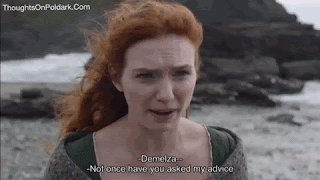 |
Adaption fiction scene not based on the true
Poldark story. |
Following Graham's narrative viewers could instead have soaked in the revived romance in a production that was more faithful to this aspect of the true story and then that should have demonstrated a romance and affection between Ross and Demelza that was even more than had ever been shown in the adaption earlier. From this, as with the book, the viewer who wavers on this point would have been more convinced that this (Ross) was man who had chosen the woman he most wanted and preferred and the depiction of his happiness had this been presented only confirmed it. Inadvertently the adaption depiction of Ross and Demelza's gloomy recoupling in the extreme could have viewers wondering "Where is the love?" and that perhaps for Ross it was still with Elizabeth. It certainly fans the flame of that presumption and are part of the subliminal messaging that Demelza might not have been Ross's best most preferred choice and perhaps Elizabeth was.  |
Adaption fiction for season 5 which was completely made
up as it was not based on any book in the Poldark saga. |
There is no doubt that the script writer for the adaption struggled with this and even entertained this idea. After all, since Ross told Demelza in The Twisted Sword' that meeting her was the luckiest day of his life, a season 5 scene of him asking Ned whether he thought they had each made the right choice of wife is dialogue that in the true story Ross would never have come close to asking. Especially after many years of a happy marriage to Demelza. The collection of subtle adaption fiction are easily missed but nevertheless plant ideas and suggestions about a different mindset that the character in the adaption might hold.
Narrative Revision: Relationship incomplete -Ross Lingers Round Elizabeth
 |
| Adaption scene not in the true Poldark Story |
New scenes in the adaption at the start of Season 3 included Ross going to Trenwith and standing starring through its windows when Valentine was born. Along side the portrayal of a not so loving and instead more moody recoupling with Demelza, this doubles down on the subliminals that not only was his reconciliation with Demelza something Ross was not revelling in and illuminated about, but that despite no storytelling of him seeing or wanting to see Elizabeth in 'The Black Moon', in the adaption he was shown as not being able to help himself from this. Even if from afar. The emotions he was supposed to be feeling and which the script writer was to convey can only be presumed, but as with that season 5 with Ross and Ned there was something intentional from the script writer who again had included in the previous season a questionable non book scene of Ross appearing distracted and upset in Demelza's presence at the thought that Elizabeth was pregnant with George's child. The scriptwriter conveyed through Demelza that his might be because he was still brooding over Elizabeth as Demelza suggested that he held her dearly in his heart and was frustrated that George Warleggan had her. 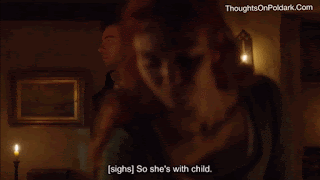 |
| Adaption scene not in the true Poldark Story |
Quite oddly that was in the last scenes of season two just before he initiated a grand speech to reconcile with her. Of course, that adaption fiction does not suggest that Ross's attitude was close to Graham's explanation of this 'completed (romantic) relationship' with Elizabeth. Clearly the script writer wanted to imply an ongoing anguish in Ross about Elizabeth. His presence starring in from outside of Trenwith might be perceived as him feeling excluded or in some conflict about pursuing or wanting a claim on Valentine to be known, rather than George to have what was his. Or for him to be able to tap into a claim through access to Elizabeth and Valentine.
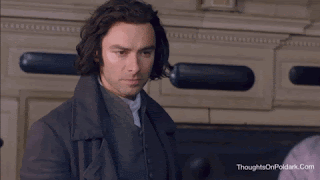 |
| Adaption fiction scene not based on the real Poldark story |
Also the adaption fiction in Season 4 strayed far from the true Poldark story and had Elizabeth visit Ross alone and take a drink with him at his London apartment. She had come as a friend seeking advice and comfort about Geoffrey Charles’s behaviour. But further to this and as if to press the idea of Ross and Elizabeth harbouring a cosy and secret three way connection with Valentine included, the adaption also had Ross sneak a visit to Trenwith, bringing Geoffrey Charles home to Elizabeth who was home with young Valentine. Once again after sharing a drink and a joke together, before kissing her hand on his way out, the adaption fiction had him staring, smiling at, and then saluting Valentine while George was out. (See animated image above.)
"Forget George and forget Elizabeth and see only all that he had. For all that he has was all that he wanted."
The Black Moon (Narrative of Ross's private thoughts)
Of course in the original story the last thing Ross wished to do was to acknowledge a connection of parentage with Valentine, as if he were an illegitimate love child of theirs that he was nevertheless proud of or emotionally attached and drawn to. Neither did Elizabeth wish to acknowledge this too! In the true Poldark story Graham did not even have Ross think much on Valentine as well as of Elizabeth, or lead the reader to think in any overt way that Ross was a man tormented by a suspicious that Valentine was his. That was not until meeting Elizabeth three years later at the Church Yard. Graham’s narrative was very far off from having Ross peer through Trenwith windows at the baby Valentine. However through these kind of additional scenes, gone was the original narrative of Elizabeth’s quiet resentment against Ross as a man she claimed bullied her in 'That May Incident' and who in any case she preferred to keep some distance from for some time. Gone from the adaption was Ross's new disappointed outlook or otherwise his detachment from Elizabeth as a woman transformed to a character that now played the role of ‘George’s wife’. Instead Ross’s attitude depicted in the books was to forget Elizabeth and certainly not to be hoovering around her. Contrary to the adaption, Graham depicted in the true story that Ross stayed true to this and as stated over those three remaining books before Elizabeth died, they met so few times and never purposefully.
Narrative Revision: Ross and Elizabeth Secret Friends Again
 |
| Adaption fiction scene not based on the real Poldark story |
At the very least, in its deviation the adaption fiction eventually promoted the idea of warm friendly feeling between Ross and Elizabeth and then a growing secret friendship. It may not be so strikingly clear in the first instance but really this deviation is quite wild. This is especially when one considers the outrage that viewers might have had if Hugh Armitage had lived and despite a confrontation and separation with Ross following his suspicions of their dalliance, Demelza went on to have secret intentional visits to Hugh's home unbeknown to Ross and where they drank and laughed alone together. Apart from that the deviation completely ignores Elizabeth long harboured ill feeling and resentment for Ross. This was to the extent that even with a softening of this resentment and some peace between them after their meeting at the Church yard, her preference and physical gut reaction to seeing him, even from a distance, was a sensation of wishing not to. This was without any suggestion that deep down there was a feeling of love him either. So scenes of them linking arms, drinking and laughing together are wildly unfaithful to the attitude of both Ross and Elizabeth in the original story. Instead that had really showed that Ross and Elizabeth had moved on from each other emotionally (romantically or friendship wise), avoided each other at social events and were instead invested in their own marriages without suggestions that either carried a torch or ongoing longing for the other. However for some viewers the adaption fiction conveyed that Ross and Elizabeth were in some way reluctantly and romantically estranged from each other due to circumstance and perhaps convenience.
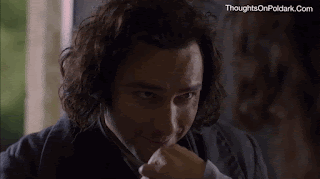 |
| Adaption fiction scene not based on the real Poldark story |
So it is from these tweaks mentioned above and many more unmentioned in the adaption fiction that may coax viewers to be drawn to surmising that romantic invisible strings between Ross and Elizabeth were indeed not quite cut as Graham’s narrative implied. Instead the adaption fiction depicts that Elizabeth still remained heavily in Ross's heart if not subdued, but still meaning that he was unable to 'forget' and cut her off as he essentially did in the true story. From this, unless viewers draw a clear distinction between the adaption as story inspired by Poldark rather than based on it or faithfully adapting it in it's entirety, they may fall into subconsciously embracing false but more resonating narratives due to the more ready made and memorable visual delivery of them, and replace them with the true Poldark story. Readers of Winston Graham's biography 'Memoirs of A Private Man' will know that he nearly took the BBC to court when the 70s version of Poldark 'based' on his book aired and he was horrified by the wild deviations to his story. Given his commentary and his book narrative he may have felt the same way about the subliminal message that Ross never really stopped loving Elizabeth, that he couldn't stay away from her and that Demelza was a wife that Ross stayed with on the basis that he 'gave up' Elizabeth. Quite possibly, given that his narrative never ever did a hard sell on Elizabeth ever really loving Ross or being able to make up her mind about this and define her feelings for him, he might have felt that the suggestion she had the same affliction of loving Ross and not being able to stay away, is an even wilder deviation.
The narrative that Ross did settle for Demelza rely on suppositions (rather than the true story narrative) or rather than anything that Winston Graham said in commentary of his story or included as narration in it. For instance the supposition that Ross stayed with Demelza because it was the right and least controversial thing for Ross to do. Also that for practical and societal reasons this was his only viable option. That idea will be explored in an upcoming post but also some viewers could perhaps have been led to perceive from the adaption fiction that while Ross did loved Demelza, that it was not as much as, or it was equal to his love formed earlier for Elizabeth. Others may perceive that Ross did actually realise Demelza was his first choice for all the right reasons after 'The May Incident' but that regardless of this, Ross still loved and remained in love with Elizabeth always. The concept of Ross continuing to love both women after 'That May Incident' is another concept to be explored in a separate post but the post to follow in this series is 'Foretellings on Demelza-Key to Ross's Real Love'. This will cover the indications not made not so obvious in the adaption but definitely in the original story. This is that Ross choosing and wanting Demelza over Elizabeth was foretold in the story long before 'That May Incident'.
Other Blogs That May Be Of Interest
.GIF)

.GIF)


.GIF)







.png)

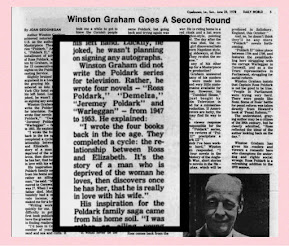
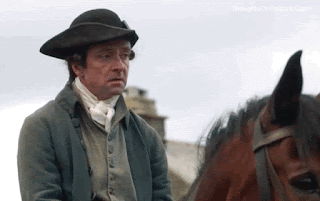
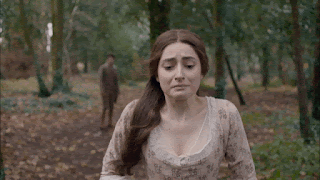
.GIF)
.GIF)










